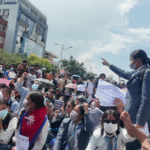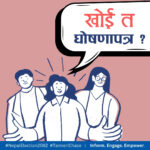Chiya, the Nepali name for tea, is more than just a popular beverage; it is an integral part of Nepali culture. In Nepali households, there is a distinct ‘chiya culture,’ which revolves around the phrase ‘let’s have chiya.’ Chiya serves as a means of socialization. The expressions ‘let’s have chiya,’ ‘chiyapan,’ and ‘chiya guff’ carry multiple meanings and connotations. Tea is a medium for social interaction and building public relations. Local tea houses in Nepal, whether in urban or rural areas, are hubs where people gather to discuss social and political issues and socialize.
The tea house is also considered a civic space. There are many instances when the civic space is inaccessible. The tea shops are informal civic spaces for political discussion, informal meetings, planning, and exercising the right of expression. For instance, in Sudan where during the war also when the In Sudan, tea stalls operated by women, often referred to as shaynat, became informal meeting spaces during political upheavals, such as the protests leading up to the Sudanese Revolution in 2019 In Myanmar During times of political suppression, teahouses in cities like Yangon became critical civic spaces for quiet political discussions. They played a role during the 2007 Saffron Revolution, where activists, journalists, and citizens used teahouses to organize and share ideas amidst government surveillance.
In Nepal, during the decades-long Maoist Conflict, the tea house in a rural village served as a civic space where the locals gathered and discussed political issues and political updates.
Tea houses, traditionally informal civic spaces, have often been exclusionary and inaccessible to women. During our research on “Gender-Based Hate Speech Against Women Politicians”, where I was part of the research team, we also conducted workshops on report findings and misinformation across all seven provinces of Nepal.
In the panel discussions held during these workshops, many women politicians openly shared the challenges they face in comparison to their male counterparts. A significant issue they highlighted was the advantage men have in leveraging informal gatherings, commonly referred to as “chiya guff” (tea-time chats). Men can easily invite people to these informal meetings, which are often crucial for networking and decision-making, without facing societal judgment.
For women leaders, however, inviting someone for chiya carries a different social connotation and is often stigmatized. This fear of social stigma deters women from engaging in such informal interactions. As a result, their lack of access to these informal spaces and opportunities for socialization has an unseen but profound impact on their career growth and political advancement.
The inaccessibility of “tea spaces” is not limited to women politicians; it also affects women in other fields. A female colleague who worked on a program with the government casually shared that, as a woman, it is challenging to invite government officials for chiya (tea), something her male counterparts could do with ease. This disparity often gives men an advantage in building relationships and influencing decisions.
Many women have expressed that men are consistently in a privileged position when it comes to accessing informal civic spaces, reinforcing their dominance in professional and social settings.
When we are celebrating the 16-day campaign against Gender based violence the focus should make to make both formal and informal public space inclusive and accessible to all group.








